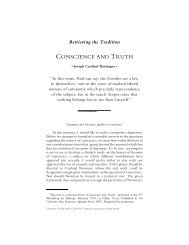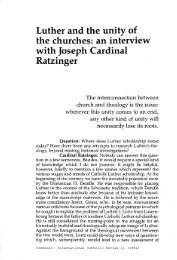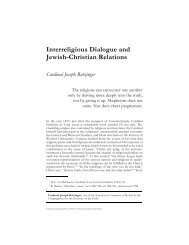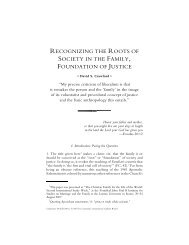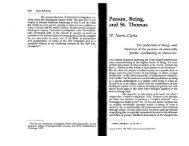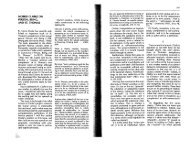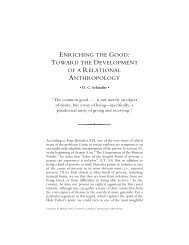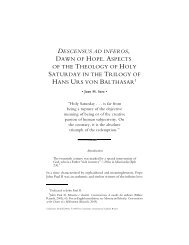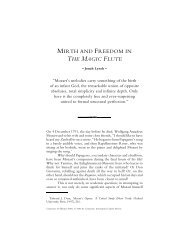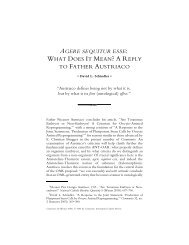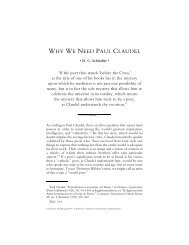Juan Sara. Secular Institutes According to Hans Urs ... - Communio
Juan Sara. Secular Institutes According to Hans Urs ... - Communio
Juan Sara. Secular Institutes According to Hans Urs ... - Communio
You also want an ePaper? Increase the reach of your titles
YUMPU automatically turns print PDFs into web optimized ePapers that Google loves.
12 Ibid.<br />
13 Ibid., 122.<br />
<strong>Secular</strong> <strong>Institutes</strong> 313<br />
donation <strong>to</strong> his Father: 12 “for I have come down from heaven, not <strong>to</strong> do<br />
my own will, but the will of the one who sent me” [allà tò thélema <strong>to</strong>ù<br />
pémpsantós me] (Jn 6:38). Christ’s earthly mode of existence in poverty,<br />
obedience, and virginity is his very “form of life.” Here, then, we find<br />
the original unity between the evangelical counsels and the life of Jesus,<br />
a unity that expresses in an incarnate way his <strong>to</strong>tal love for the Father.<br />
Moreover, Jesus communicates this unity <strong>to</strong> his own,<br />
inviting or counseling those who can and, therefore, must hear,<br />
literally (sine glossa, as Francis of Assisi put it) <strong>to</strong> “sell all” (Lk 18:22),<br />
<strong>to</strong> leave “house or brothers or sisters or mother or father or children<br />
or lands for my sake and for the Gospel” (Mk 10:29), <strong>to</strong> leave<br />
“house or wife or brothers or parents or children for the sake of the<br />
kingdom of God” (Lk 18:29). This act of leaving everything is the<br />
initial and permanent moment of an exclusive following of Jesus (Mt<br />
19:21, 29), a following that involves taking something of his cross<br />
and losing one’s life for him without complaint (Lk 9:23ff). This is<br />
not, of course, a negative or neutral self-emptying, a leap in<strong>to</strong> the<br />
void or in<strong>to</strong> what the egocentrism of a fallen world considers the<br />
“beyond.” It is rather a following of Christ’s self-giving <strong>to</strong> the Father<br />
in incarna<strong>to</strong>ry, cruciform, eucharistic love. This “beyond,” this “always<br />
more” that characterizes the Son’s relation <strong>to</strong> the Father, is never a<br />
neutral vacuum, but the Person of the Holy Spirit. The Spirit is the<br />
holy bond linking the Word and the Father; he is their “beyond,” the<br />
personal embodiment of the fruitful “more” of their love.<br />
The Church itself (and so all of the states that form its<br />
structure), originates in the Person of Christ. 13 The Church<br />
participates in Jesus’ original “state” in and before his Father in the<br />
Spirit. It participates in the eccentric-concentric state that the Son<br />
takes on in his incarnation for the salvation of the world: from the<br />
Father <strong>to</strong> the world and, <strong>to</strong>gether with the world, <strong>to</strong>ward the Father<br />
(incarnation—cross—eucharist—glory).<br />
Now, the Church is not merely an extension of the Son<br />
without any freedom of its own. Rather, it comes in<strong>to</strong> being thanks<br />
<strong>to</strong> the primordial created response given by Mary at the<br />
Annunciation and at the foot of the cross. Mary’s unlimited “Yes,”<br />
which is obedient, virginal, and poor, is the condition of her<br />
maternal fruitfulness; it is the bond linking her divine maternity and



